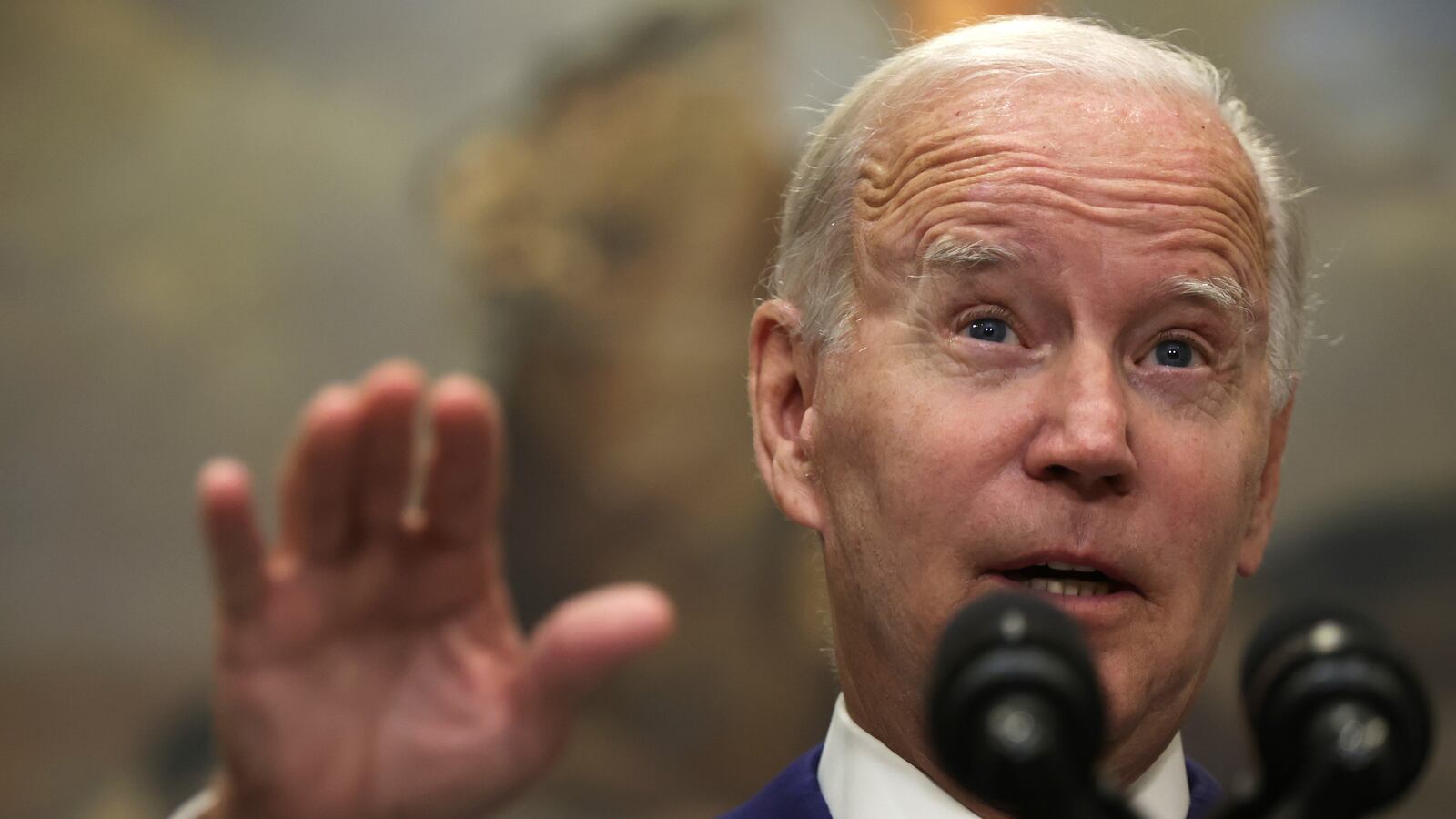With the promised red tsunami starting to look more like a red ripple, Republicans have been desperate for something—anything—to return November’s midterms to their normal historical trajectory.
Joe Biden might have just handed it to them.
“What we're seeing now is either the beginning or the death knell of an extreme MAGA philosophy,” Biden told Democratic donors during a private meeting last week. “It's not just Trump, it's the entire philosophy that underpins the—I'm going to say something: It's like semi-fascism.”
Later, at a different Democratic event, Biden continued: “I respect conservative Republicans. I don’t respect these MAGA Republicans…There are not many real Republicans anymore.”
Putting aside Biden’s penchant for hyperbolic gaffes, there may be a method to his madness. “There is a reason Democrats are eager to keep Trump at the center of the conversation,” tweeted conservative Ben Shapiro, “half of independents say Trump is a major factor in their vote, and they're breaking 4-1 for the Democrats. Republicans shouldn't play that game. If they do, they're cruising for a bruising.”
The Jan. 6 Capitol riot (“Hang Mike Pence!”), and the more widespread phenomenon of election denying candidates winning subsequent GOP primaries, demonstrates this is not your father’s Republican Party.
Still, Biden should be aware that similar observations—despite their veracity or seeming political utility with the base—have backfired in the past.
In 2012, a video surfaced of Mitt Romney telling a private group of donors that “There are 47 percent who are with [Obama], who are dependent upon government, who believe that they are victims, who believe the government has a responsibility to care for them…And they will vote for this president no matter what.”
Now, there was some truth to Romney’s statement. About half of American households don’t pay any income tax. Some percentage of voters are habitual (unpersuadable) Democratic voters. Some percentage of Democrats are socialists. Likewise, some percentage of Americans who receive benefits, probably do vote in their own economic self-interest.
None of these caveats mattered.
Four years later, Hillary Clinton made a similar mistake, saying: “you could put half of Trump's supporters into what I call the basket of deplorables. Right? The racist, sexist, homophobic, xenophobic, Islamophobic—you name it.”
Like Romney, she played to the crowd and exaggerated the numbers of Americans she could write off. And like Romney’s “47 percent” line, there was some element of truth in there, too.
The other thing they had in common? They both lost.
Unlike Romney and Clinton, Biden isn’t running for president (not now, at least), and it may be that midterm voters “are not factoring Biden into their down-ballot calculations,” as the conservative writer Matthew Continetti hypothesizes.
Still, Biden just opened himself up to the same criticism that proved so lethal in 2012 and 2016—even if he did add the weasel-word “semi” in front of the F-bomb.
Indeed, New Hampshire Gov. Chris Sununu—hardly a Trumper—unveiled the predictable pushback on CNN’s State of the Union on Sunday: “The fact that the president would go out and just insult half of America…effectively call half of America semi-fascist because he's trying to stir up controversy, he's trying to stir up this anti-Republican sentiment right before the election…it's horribly inappropriate.”
Dismissing half the nation as irredeemable, it seems, is a dicey gambit.
But it would be a mistake for me to stop here without analyzing the uniqueness of the word fascist.
Almost nobody knows exactly what a fascist is, as partly evidenced by the fact that it is typically used as a stand-in for “authoritarian.” In the movie Bull Durham, Crash Davis (played by Kevin Costner) says that strikeouts are “fascist”—unlike ground balls, which he says are more “democratic."
My simplistic shorthand for “fascism” is “right-wing socialism,” but not everyone even agrees it is exclusively a right-wing thing. In a recent column revisiting his 2008 book Liberal Fascism, Jonah Goldberg describes fascism as a “highly concentrated and toxic form of populism that manifests itself as the politics of mobs, not manifestos.”
By this definition, there’s a legitimate case for Biden to call the MAGA philosophy “semi-fascism.” Look no further than the Jan. 6 riot, the fake electors scheme, or the links between Trumpworld and paramilitary groups like the Proud Boys and Oath Keepers and Trump supporters for evidence. Or, most recently, consider Sen. Lindsay Graham’s warning this past weekend that there would be “riots in the streets” if Trump is prosecuted.
The danger is that for most of my life, the word “fascist” has been cavalierly tossed around to basically associate conservatives with “Nazis.” For this reason, Biden risks reminding everyone that liberals have cried wolf before. Similar slurs were hurled at Reagan.
On the other hand, the fact that this word has been bandied about so often might make it ironically less likely to backfire. There was something freshly transgressive about labeling oneself a “deplorable.” That’s not the case with “fascist” (although, in some circles, “semi-fascist” may have some ironic t-shirt potential).
Regardless of whether this will backfire against Biden, this strikes me as the latest example of Biden abandoning the mandate of being the opposite of Trump. Like his decision to cancel student debt, Joe Biden’s invocation of the F-word can better be understood as a man more focused on riling up his base than as a president committed to restoring norms.
The only question that remains is whether this moment will matter—whether Biden’s use of the F-word will be a big F-ing deal.







